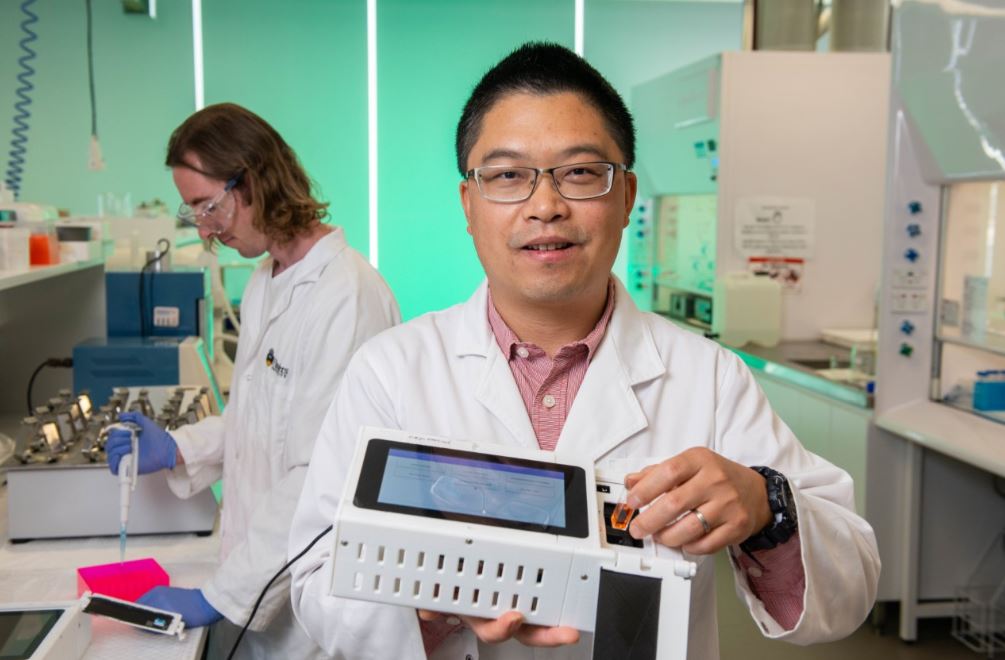
A new portable medical device for monitoring and early detection of chronic kidney disease, which affects an estimated 9% of the world’s population, has been shown to have potential to service rural and remote patients and communities with limited medical services.
The affordable and portable device – designed, constructed and evaluated by Flinders University researchers – can accurately measure levels of albumin in patients’ urine, according to a recent clinical trial conducted at Flinders Medical Centre (FMC), a tertiary teaching hospital in Adelaide, South Australia.
The results, published in Sensing and Bio-Sensing Research (Elsevier), used a 3D printed medical device to accurately measure concentrations of albumin in urine samples via an advanced specified aggregation induced emission (AIE) biosensor.

Elevated albuminuria levels indicate an individual’s kidneys are not filtering blood proteins effectively.
An estimated 1.7 million Australian adults had biomedical signs of chronic kidney disease (CKD) in 2011-12, but the disease remains a highly under-diagnosed condition. In Aboriginal and Torres Strait Islander communities, CKD is present in up to 18% of some populations (2012-13 Australian Bureau of Statistics Biomedical Results).
This device is also adaptable for potential monitoring of cancers, amyloid fibrils, and other disease biomarkers.
“The results of urine albumin levels measured in light wavelengths by the system had a strong correlation to the clinical values of the samples tested by SA pathology labs,” says co-author Flinders University Associate Professor Jordan Li, from the Department of Renal Medicine at FMC.

“A reliable, portable device to accurately measure urine albumin could be rolled out to point-of-care testing sites in the community to reduce the need for patients with chronic kidney disease to regularly visit a hospital or clinic,” says co-author Professor Karen Reynolds, Director of Flinders University’s Medical Device Research Institute and Joint Research Centre for Personal Health Technologies at Tonsley Innovation District.
“It will also help early detection of kidney disease which is imperative for early intervention to slow its progression,” she says.
Lead researcher Professor Youhong Tang says the system can be used with ease in the field.
The system requires a digital camera, embedded printed circuit boards, single light source and access to the software and “can be operated by anyone without the need for a clinical setting or expert diagnostic laboratory,” Professor Tang says.
The platform in the proof-of-concept study was able to detect urinary albumin with high accuracy and low cost, making it a potential device for detecting and monitoring albuminuria levels for kidney disease.
 The article, Developing a fluorescent sensing based portable medical open-platform – a case study for albuminuria measurement in chronic kidney disease screening and monitoring (2022) by Anh Tran Tam Pham, Damian Tohl, Angus Wallace, Qi Hu, Jordan Li, Karen J Reynolds and Youhong Tang has been published in Sensing and Bio-Sensing Research (Elsevier) DOI: 10.1016/j.sbsr.2022.100504.
The article, Developing a fluorescent sensing based portable medical open-platform – a case study for albuminuria measurement in chronic kidney disease screening and monitoring (2022) by Anh Tran Tam Pham, Damian Tohl, Angus Wallace, Qi Hu, Jordan Li, Karen J Reynolds and Youhong Tang has been published in Sensing and Bio-Sensing Research (Elsevier) DOI: 10.1016/j.sbsr.2022.100504.
Acknowledgements: The project was funded by the Australia-China Science and Research Fund through Joint Research Centre for Personal Health Technologies, Australian Government Department of Industry, Science, Energy and Resources.
See also, Inorganic-organic hybrid materials to detect urinary biomarkers: recent progress and future prospects (2022) by Qi Hu, Dan Ding and Youhong Tang, which is an August 2022 cover feature in Materials Chemistry Frontiers (Royal Society of Chemistry) DOI: 10.1039/D2QM00213B.

